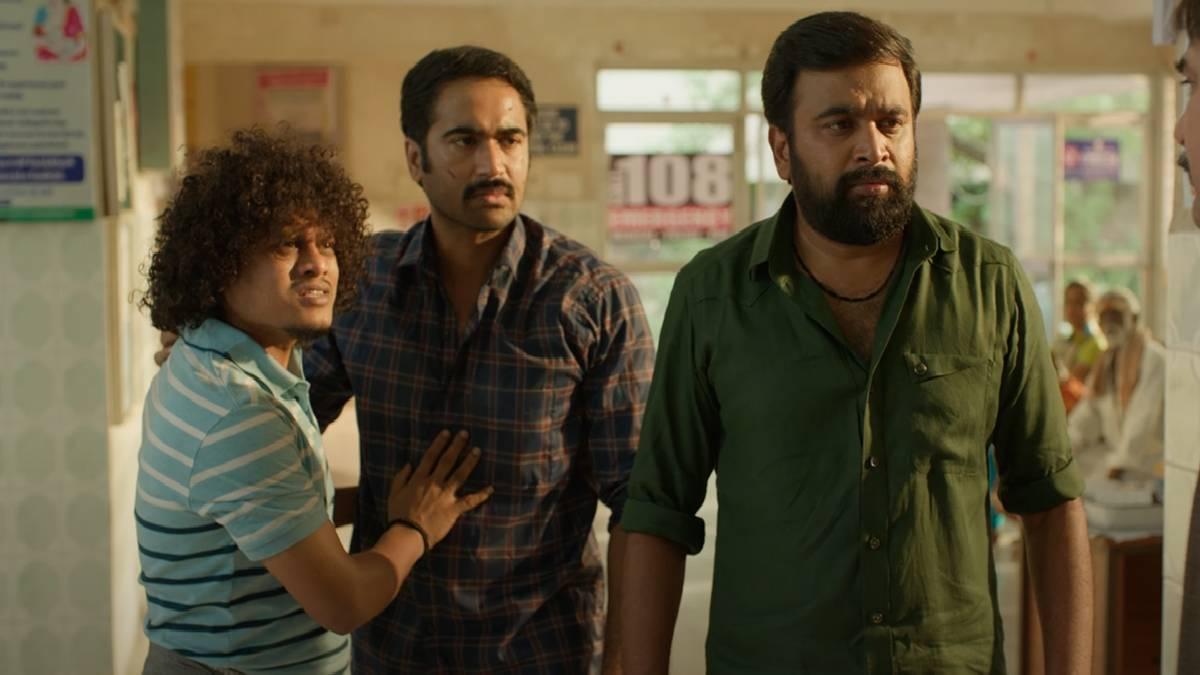
Sasikumar takes the back seat in ‘Ayothi’ and lets humanity save the day
The Hindu
Ayothi, directed by Manthira Moorthy, has Sasikumar and Pughazh okay two friends who give it their all to save a family from an ill-fated situation
What makes India unique is how, over centuries, the subcontinent has become a melting pot of cultures, traditions, languages, and of course, religion and caste. It has assimilated into a homogeneous society that keeps its heterogeneous norms alive. While some are flexible with those norms, others find them to be the principle of life, an ingrained doctrine that has to be followed, at times sanctimoniously, but also savaged. Sasikumar’s latest film Ayothi puts that to the test to find out what’s more important. Creed or blood? Faith or family? Divinity or humanity?
When a family, under the “care” of its chauvinistic patriarch Balram (Yashpal), travels to Rameshwaram, his actions inadvertently cause the death of his wife Janki (Anju Asrani), leaving their two children Shivani (Preethi Asrani) and Sonu (Advaith Vinod) in pain and distress. Stuck in a new land whose residents don’t speak their language, the trio are helped by two locals (played by Sasikumar and Pugazh) who find out that sending a dead body via plane is a process marred by red-tapism. If that’s not enough, they also have to deal with an ordeal in the form of Balram and his practices that are anything but practical.
Despite missing this film’s theatrical release and watching it on OTT, I thankfully didn’t happen to read anything on Ayothi which, owing to its name, I assumed was a film on either religion, the city’s impressive ancient history, or its contentious recent past. Just a few minutes into the film, it establishes that Ayothi is about something more critical and valuable than them all; it’s about humanity.
Sasikumar helping others has unofficially become a genre on its own in Tamil cinema. But unlike the Nadodigal films, the drama is substantially lower in Ayothi. For starters, the premise is simple and despite scratching the surface of some heavy topics, the solution to the conflicts are intentionally kept elementary and straightforward. Not only does this keep the happenings grounded and relatable, given how they are apparently based on real incidents, but it also aids in keeping the film’s underlying message palpable.
On the flip side, the film is far from perfect. Despite its pragmatic portrayal of a serious situation, Ayothi has an actual hero introduction fight and an unnecessary song, which, in all likelihood, feels forcibly added in an attempt to make it commercially viable. What doesn’t feel like a deliberate mistake is the one-dimensional melodramatic writing for its antagonist Balram. Though establishing his affinity towards his religion and its principles, the film goes out of its way to charter a route to show us how, as an individual, he’s a vile person. That’s endorsed by making him curt to strangers by default and physically abusive towards his wife. Given that the film revolves around his transformation over the course of the story, his character arc feels extremely convenient and predictable.
Thankfully, the film makes up for it with a lot of redeeming factors. For starters, Sasikumar, apart from the introduction sequence, doesn’t give us the impression of a hero, and that’s a compliment. He lets the story take the wheel and becomes a victim of circumstances instead of the purveyor of instant ideas. Interestingly, and ironically as well, Pugazh’s first memorable big screen appearance is in this film where he isn’t a comedian. He actually pulls off the ‘friend in need’ role quite convincingly. It’s the experienced Hindi actor Yashpal Sharma and the relatively new Preethi Asrani, who steal the show as the husband and daughter of the deceased. While Yashpal does a persuasive job of making us hate his character, Preethi pulls off the role of a teenager on the brink of an eruption, thanks to her chauvinistic father, really well. And when she finally explodes, it makes for a better theatre moment than the hero’s introductory fight sequence.
Apart from the obvious love triumphs all trope, it’s apparent that the makers were extremely cautious with how the Hindi-speaking characters are portrayed. The actions of Balram are attributed only to him and not directed towards any community, those speaking a certain language or are from a certain part of the country. At a time when a series of incidents has led to panic among North Indians living in Tamil Nadu, a film on inclusivity feels rather necessary. The film’s creative choice to keep the Hindi lines as such and not water them down with Tamil voiceover lends to the authenticity. The simple but effective twist in the end only adds to the beautiful message the film puts forth.











